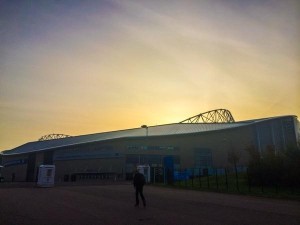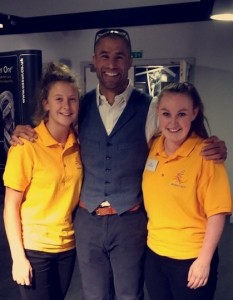Association of Chartered Physiotherapists in Sport and Exercise Medicine blog series @PhysiosinSport
By Jazz Shiret and Aoife Bannon
 Our recent experience volunteering at the ACPSEM “Physios in Sport Young Athlete Conference,” held in early October at the wonderful Amex Stadium in Brighton, dispelled a stereotype (commonly held by conference newbies) that a “conference” is just full of unapproachable people in suits, giving ‘expert’ presentations, packed-with complex terminology.
Our recent experience volunteering at the ACPSEM “Physios in Sport Young Athlete Conference,” held in early October at the wonderful Amex Stadium in Brighton, dispelled a stereotype (commonly held by conference newbies) that a “conference” is just full of unapproachable people in suits, giving ‘expert’ presentations, packed-with complex terminology.
We were really excited to volunteer, but as the time got closer we realised that we would have to make conversation with these ‘well-dressed experts.’ We got slightly nervous.
How do I approach them? Would they want to talk to me, a student? What questions can I ask? Will I sound stupid? Will I understand what they are talking about?
Dispelling the fears with on the ground experience…
Five impressions stood out over the first two days:
- Despite unique areas of focus related to the prevention and treatment of young athletes, many of the speakers’ ‘key findings’ had a high degree of relate-ability to a range of sporting environments. From football, to golf, ballet, and gymnastics, we learned that a physio’s primary focus should always be on the development and well-being of the child and their enjoyment of their sport.
- The passion and wealth of knowledge that the speakers showed for their interest areas was really inspiring. As one example, a presentation on safeguarding children within a club or organised sport environment highlighted the importance of ethics. We learned: (i) our responsibility is collective, with the child’s interests and health being of paramount importance (ii) the language we use when dealing with young athletes can be a powerful and determining factor in successful management (iii) we must be aware of the reaction that our choice of words could bring about and how this can impact their understanding and form their attitudes permanently.
- The conference provided insight into the physiotherapist’s role in a sports club setting (and also showed the similarities to a more traditional MDT seen on our placements). The presenters suggested that the most effective practice requires excellent communication skills, a level of understanding of each discipline and how the roles interlink. A number of speakers mentioned great insights: (i) the importance of gaining the coaches trust and confidence (ii) Good communication between players/children or adolescent, their families and coaches is essential (ii) Correct diagnosis and understanding how training volumes affect injury risk is important, and explaining this to young patients, parents and coaches in language that is meaningful and respectful of them is vital. (iii) The process of returning our athletes back to training and competition following injury or an off season break can be helped by using technology like GPS to monitor the load placed on athletes during these times.
- It was also interesting to hear about hot topics such as concussion and head injury (Dr Jonathan Hanson @sportsdocskye), screening young athletes for cardiac problems as early as possible (Dr Andrew D’Silva) and Apophysitis Syndromes (Jenny Strickland).
- A final message we took away from the two days was to be mindful of the huge individual variation between young athletes even within those of the same chronological age.
Prior to the conference we were concerned that we wouldn’t be able to understand the content of speakers to an advanced depth. Some concepts were definitely new to us, but rather than inflate insecurities, these moments underscored the importance of continuous learning, reflection, and asking thoughtful questions in order to improve our practice.
Also, the multiple opportunities to ask speakers questions one-on-one lessened our nerves about asking a ‘silly question’ in front of the whole audience. It was really lovely to see how most of the speakers happily took time to engage with students by clearly responding to their questions.
Overall this weekend was thoroughly enjoyable and a rich learning experience. It was an inspirational weekend we will not forget!
We now realise that all those ‘well-dressed experts’ are not scary. They are just normal people who share our passion and do in fact most of the time enjoy talking to us students! The relaxed atmosphere contributed to a successful and enjoyable conference by all.
We significantly expanded our knowledge base, but also confirmed there much more to learn.
Bonus conference highlight
 We both wholeheartedly agreed that the conference highlight was listening to the Richard Parks (@RichardParks), former international rugby player turned extreme adventurer, speak about the critical role physiotherapists (and physiotherapy) played in his career. We fortunately got to meet and chat with and his physiotherapist, Nicky Philips (@NicolaPhillPT), as well as getting a cheeky photo with him. We can now safely say that we won’t think twice about going to another conference soon.
We both wholeheartedly agreed that the conference highlight was listening to the Richard Parks (@RichardParks), former international rugby player turned extreme adventurer, speak about the critical role physiotherapists (and physiotherapy) played in his career. We fortunately got to meet and chat with and his physiotherapist, Nicky Philips (@NicolaPhillPT), as well as getting a cheeky photo with him. We can now safely say that we won’t think twice about going to another conference soon.
Finally we would like to say a very special thank you to Sam Blanchard (@SJBPhysio_sport) and all the committee members for giving us this opportunity and to all the other volunteers who helped make the two days run smoothly.
Hope you enjoyed the blog,
Yours in sport,
Jazz & Aoife
Jazz Shiret (@JazzShiret) and Aoife Bannon (@AoifeBannon) are both 3rd year physiotherapy students at the University of Brighton as well as being student members for the ACPSEM (@Physiosinsport).